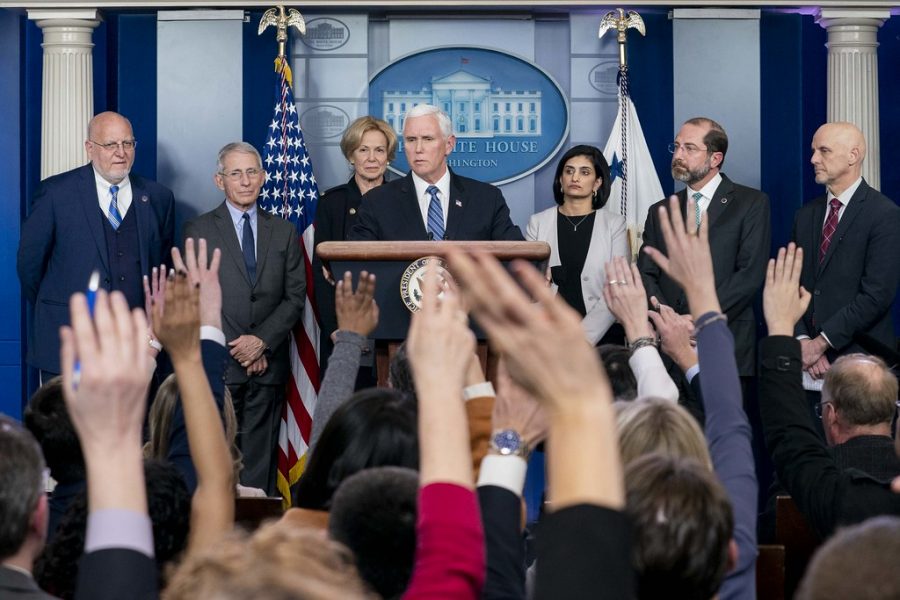America needs a strong, centralized government in this national emergency
Vice President Mike Pence holds a press conference with Secretary of Health and Human Services Alex Azar and the White House Coronavirus Response Coordinator Dr. Deborah Birx Monday, March 2, 2020, in the White House Press Briefing Room.
March 18, 2020
The United States prides itself on upholding democratic principles in all facets of daily life – among them are individual liberty, self-rule and self-determination. But in times of crisis, like the pandemic we face today, the hands-off approach of the federal government does more harm than good.
Thus far, the United States has had a weak response to the COVID-19 pandemic compared to other countries heavily affected. China, for example, enforced heavy-handed mass quarantines; Japan closed all public schools nationwide without hesitation; Italy shut down shops and restaurants across the country. In the U.S., there may be no better anecdote to describe the situation than sports leagues voluntarily choosing to lose out on billions by postponing their seasons before our government chose to close schools or businesses. Our government’s purpose is to protect us, so when a profit-oriented body (like the National Basketball Association) acts before a body focused on the well-being of its constituents, you can tell that something is wrong.
But now that the government is taking some more aggressive action to halt this virus’s spread, their decisions are undeniably going to be met with resistance, both from within the country’s legislating bodies and in the general public. Their frustration is understandable – losing individual freedoms is never ideal, but let’s be taught by our own United States history.
Nearly one century ago in 1929, the Great Depression presented an unprecedented problem to the American people. The president at the time, Herbert Hoover, was a believer in rugged individualism and small government, and while his values may have fit well with the care-free roaring twenties, it left Americans with no safety net or way to recover after Black Tuesday. Stock markets and employment rates only began to climb back up after the election of Franklin Delano Roosevelt and his implementation of the New Deal programs, which boosted centralized government power at the expense of individual freedom.
In lieu of federal action, the White House has left most decisions up to the state or local level, creating a vast disparity in how we’re treating the virus, aligned by political motives. Some states, like New Jersey, have taken more aggressive measures to prevent the spread of this disease, like the closure of all restaurants in certain towns and a highly encouraged state-wide 8 p.m. curfew. Other states, however, have taken little decisive action to halt the spread of the virus, rendering any quarantines, lockdowns or closures ineffective. This pandemic requires strong actions on the federal level, not just on the state level, similarly to other nationwide crises. This virus is like fighting a war; if FDR had left the decision of whether or not to enter World War II up to individual states, it would become very clear that a decentralized government is not well-suited to urgent, national emergencies. This lack of federal initiative creates a divide in our government, and also in our people, since the public will likely only take the virus as seriously as its government does.
While we may have to drop some of our beloved American values like rugged individualism, we can readopt some that we may have forgotten along the way. If there’s any silver lining of a crisis like this, it’s unity. We have lived in a world of “us and them,” “government and the people,” or “republicans and democrats.” While the Founding Fathers couldn’t have predicted the Coronavirus outbreak, they did predict that united we stand and divided we fall. It’s time for all of us, not us or them, to find this common political ground and to let it guide us to strong policymaking that can kick this virus off of our shores, once and for all.




